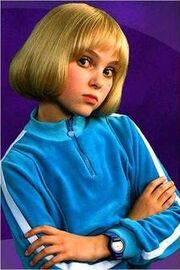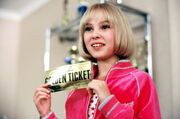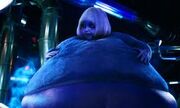Violet Beauregarde is a fictional character from the Roald Dahl novel Charlie and the Chocolate Factory and the

Violet Beauregarde as she appears in the 2005 film.
subsequent film adaptations. She is the third winner of the Golden Ticket, and the second child to meet her endgame at Wonka's factory. Violet Beauregarde is the one the four main antagonists of the 2005 film.
Background
In each version, Violet Beauregarde is the third of the five children to find one of Willy Wonka's exclusive Golden Tickets, the second of (originally three) two girls to win a Golden Ticket, as well as the second to be kicked off the tour due to disobedience of Wonka's orders. She exhibits a more competitive spirit than the five other ticket winners, particularly in the 2005 movie, in which her ambitious behavior is greatly expanded to include her participation in sports and martial arts. Violet is also a notoriously relentless and competitive gum chewer, though she temporarily curbed her habit in order to focus Wonka Bars and search for the ticket. Most versions have Violet calling her mother simply "Mother", out of arrogance or pride depending on which version you're into. Violet just ignored Mr Willy Wonka, so she is very ignorant. In the book she is called Miss Violet Beauregarde and is mostly called a lady in spite of her bad manners, so she can be assumed to be the oldest of the children.
Violet in the novel
Violet is described in the original novel as having a "great big mop of curly hair" and as someone who talks "very fast and very loudly." Like Augustus Gloop, Veruca Salt, and Mike Teavee her nationality is not mentioned (she hails from America in the films). Both her parents accompany her to the factory. During her newspaper interview she talks more about her gum chewing obsession than her ticket. She is depicted from illustrator to illustrator wearing jeans and a T-shirt, as a reflection of her tomboyish ways.
Violet in the films
In the 1971 film Willy Wonka & the Chocolate Factory, Violet was depicted as a preteen girl from Miles City, Montana, and was played by Denise Nickerson. Her father, Sam Beauregarde, is a "prominent" local politician, civic leader and a used car salesman who uses Violet's television interview for free advertising of his car dealership. Violet uses her television interview to demean Cornelia Prinzmetel far more than she does in the novel. There is no interaction between Violet and Veruca Salt (or unused character Miranda Piker) in the novel, but in the film, the girls are seen pushing and shoving each other when walking down the Chocolate Room stairs. Violet thinks Veruca is stupid and annoying, calling her a nit in the 1971 film when she begs her father for an Oompa Loompa and also calls her a twit when Veruca says she (Violet) got two everlasting gobstoppers. Like Mike Teavee, Augustus Gloop and Veruca Salt, Violet gets along fairly well with Charlie. She seems less rude in this film than in the 2005 film and, as the Oompa Loompas say in her departure song, she just needs to improve on her manners.
In the 2005 film adaption, Violet (played by AnnaSophia Robb) is again a preteen, but her hometown has been changed to Atlanta, Georgia. However, unlike the novel and 1971 film, she is mean to Charlie (more than Augustus was), and goes so far as to call him a "loser".

Violet with her Golden Ticket
She is athletic and has a vicious competitive streak, having won 263 trophies and medals in various events ranging from martial arts competitions to gum-chewing contests; she is a junior champion and world-record holder in the latter. Violet and her mother wear matching outfits and have matiching hairstyles. Violet had been working on the same piece of gum for three months straight at the time that she had found her Golden Ticket. During the ticket search, she temporarily laid off gum and switched to Wonka Bars, keeping the aforementioned wad stored behind her ear in the meantime. Violet's mother Scarlett Beauregarde (played by Missi Pyle), a former baton champion herself, initially encourages her daughter's unladylike behavior and rude attitude, acting in a true soccer mom/stage mom/female football coach fashion; however, her approval and pride of her daughter turns into disapproval and embarrassment when they leave the factory and head back to Atlanta, after she encouraged Violet's act of disobedience to Wonka's commands.
Violet in the video games
In the 1985 video game based off of the book, a level involves the avoiding of blueberries thrown by Violet. The 2005 film's game requires Charlie to escort Violet (by rolling her around) to the Juicing Room, where he must take her to Wonka's juicer to squeeze her back to normal. Violet seems much slimmer than in the movie and her blueberry form is much smaller and similar to the 1971 movie.
Violet's endgame
Wonka invents a gum that contains an entire three-course dinner: tomato soup, roast beef with baked potato and blueberry pie with ice cream (pea soup, roast beef and blueberry ice cream in the theatrical shows), but forbids Violet to chew it as it is not ready for human consumption just yet. Violet rudely snaps that she holds the world record in chewing gum and begins anyway, ignoring Wonka's protests. However, the blueberry pie stage is defective, which causes Violet to turn blue and expand into a giant blueberry. She is unable to walk due to her girth, and Wonka tells the Oompa Loompas to roll her to the juicing room to extract the blueberry juice immediately, implying that more swelling will cause her to explode.

Violet in her blueberry form
In the original, Violet blows up to smaller proportions but everyone (including her father) is still surprised; due to her girth, and before she can waddle too far, she is lowered to the ground by the watchful Oompa-Loompas. She is rolled to the juicing room by a team of Oompa-Loompas but is not seen again, and there is a twist as Mr. Wonka said she might explode. Violet is not seen again after being rolled away, but Wonka simply assures Charlie that all the other children will be returned to their normal "terrible" selves. She with the Oompa Loompas is also the only one present during her song in the 1971 film.
In the 2005 version, Violet grows more than just a few centimeters, instead swelling to a much higher rate than the novel, almost reaching the Inventing Room's catwalks. Her mother does not seem to care about this predicament happening to Violet herself, but that her daughter can no longer compete, and asks Wonka about the subject. Veruca responds, "You could put her in a county fair," and by the look on her face, Scarlett is both offended and considering the idea.
She is also seen exiting the factory with her mother after the tour. She has been deflated back to normal size, but rather than just walking, she somersaults, cartwheels and backflips down the stairs and the front walk, apparently becoming more flexible (like chewing gum, appropriately) and her skin, hair and clothes are now a seemingly-permanent shade of blue. She is actually pleased with her new pliability, but her mother is very angry with her daughter for disobeying Wonka's orders (and embarrassed that she encouraged Violet to do so), and judging by the look on her face and the tone of her voice in her final line ("Yes, but you're blue."), she is fed up with coaching her daughter and treating her like an overconfident athlete, her exceeding pride in her entirely gone. In the novel, Violet ends up with purple skin but there is no mention of increased dexterity.
The filmmakers of the 1971 adaptation simulated the blueberry scene by inflating Nickerson in a rubber suit and composed her outline in two halves of a styrofoam ball, and it took 45 minutes to get her into costume. Nickerson was unable to go to lunch during rehearsals; instead she was rolled around on set every five minutes to keep blood circulating. Nickerson recalls that Julie Dawn Cole, who played Veruca, saw her as the "cool American girl", but "when she saw [Nickerson] as a big purple ball, [Nickerson] was completely embarassed." In the 2005 version, at the request of director Tim Burton, the filmmakers combined real footage of Robb with digital effects in order to increase the overall size of the blueberry rather than just the width (as depicted inthe novel), as well as for the scene of Violet and her mother leaving the factory.

Violet with her new third, seemingly-permanent and flexible form
Violet Beauregarde song
The original song in the novel featured a "Miss Bigelow" who chewed gum day in and day out for years before her jaws bit her tongue in two, and how the Oompa Loompas wanted to prevent the same thing happening to Violet. In the 2005 version, this song takes place in the Inventing Room, where the multicourse gum was created. It is sung by the Oompa Loompas while Violet is being rolled around in blueberry form, and the lyrics contain 42 repetitions of the word "chewing." The track uses the same pitch in voice, accompanied by a '70s funk-style sound. In the 1971 version, the song merely talks about how chewing gum for long periods of time is repulsive. In the theatrical shows, her song is called "Chew It", which talks about her love of chewing gum and how it's her life long dream to chew the same stick all her life. It is followed by her Oompa-Loompa song, which is either sung by the Oompa-Loompas with her present, by her with the Oompa-Loompas present, by the Oompa-Loompas without her present, or by the actress who plays Violet while backstage with only the Oompa-Loompas and a Violet blueberry model present onstage.
Personality
Violet obtains a monomaniacal connection with chewing gum. She even tries to break the world record on how long she chews the gum, which she boasts to have beaten her very best friend. In the book, little of her personality is revealed. However, in the 1971 film her personality is extremely talkative, brash, cynical and sometimes hot-tempered. She unleashes her temper on her unseen mother, her father and twice on Veruca Salt. She has little degree of bearability, and becomes annoyed with Veruca's constant demanding to her father. Her personality in the modern adaption is more detailed. She is just as arrogant as Veruca Salt (and her mother), and also overcompetitive. She shows incredible reflexes in martial arts and almost inhuman speed. Her brash, vicious personality is thickened by her mother's exceeding vanity and unhealthily strong praise of her daughter. Violet also shows nihilism and extreme cynicism towards other people, such as Veruca Salt and Charlie Bucket. She is just as callous as her mother, labelling everyone else as losers and non-entities. However, this callousness is immediately disapproved of by her mother when they exit the factory.